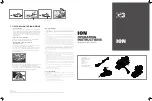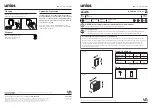
19
To reduce the risk of serious injury, read and follow all of the warnings, precautions, and instructions in this manual before you use the
trampoline enclosure. Warnings and instructions for care, maintenance, and use of this trampoline and enclosure are included to promote safe
enjoyable use of this equipment.
1. It is the responsibility of the owner and supervisors of the
trampoline and enclosure to make sure all users obey the
safety instructions given in this manual. The trampoline should
only be used with mature, knowledgeable supervision.
2. Secure the trampoline and trampoline enclosure against
unauthorized and unsupervised use. If you use a ladder to
get on and off the trampoline, be sure to remove it when the
trampoline and enclosure are not being used.
3. Be sure there is enough clear space above the trampoline and
enclosure before use. It is best to have at least 24 feet (7.3
meters) of clear space above the ground. This space must be
clear of wires, tree limbs, and any other possible hazards.
4. Lateral (sideways) clearance is very important. Do not place
the trampoline and enclosure near walls, buildings, fences,
sidewalks, and other play areas. Always keep a clear space on
all sides of the trampoline and enclosure.
5. Remove any objects that could interfere with the performer.
Maintain a clear area around and under the trampoline.
6. Be sure the trampoline and enclosure are on a level surface
before use.
7. Always inspect the trampoline and enclosure before each
use. Make sure that the frame, padding, netting, enclosure
tubes, and foam sleeves are correctly and securely positioned.
Replace any worn, defective, or missing parts. (Jumpers may
be hurt if the trampoline and enclosure are used when they are
in poor condition.)
8. Bounce only when the surface of the mat (bed) is dry. There
should be very little or no wind or air movement. The trampoline
and enclosure must not be used in gusty or severe winds.
9. The trampoline and enclosure frames are made of metal. They
are not grounded and will conduct electricity. For this reason,
an electrocution hazard exists. No lights, electric heaters,
extension cords, or household electrical appliances are to be
permitted on the trampoline or in enclosure at any time.
10. Use the trampoline and enclosure in an area with lots of light.
If the trampoline and enclosure are indoors or in shady areas,
you may need to us artificial (electrical) lighting in the area.
11. During the winter months, the trampoline soft materials will
need to be removed and stored in a dry place. If left up in the
winter months, it may cause damage to the springs, jump mat,
spring pad, and enclosure. The warranty will be void.
12. This trampoline and enclosure is made for users who weigh
less than 175 lbs.
13. Trampoline over 20 in. (51 cm) tall are not recommended for use
by children under 6 years of age.
14. The trampoline enclosure is to be used only with the size of
trampoline for which the enclosure is designed.
15. Misuse and abuse of the trampoline enclosure is dangerous
and can cause serious injury.
16. Do not attach anything to the enclosure barrier that is not a
manufacturer-approved accessory or part of the enclosure
system.
17. Please remove any jewelry before jumping begins. Jewelry may
get caught in the enclosure netting.
18. Wear clothing free of drawstrings, hooks, loops, or anything
that could be caught while using the trampoline/enclosure and
result in entanglement, strangulation, or both.
19. DO NOT let more than one person inside the trampoline
enclosure at the same time. Two or more people jumping at the
same time can cause serious injury.
20. DO NOT jump on the trampoline while you have or are holding
any objects, especially something sharp or breakable.
21. DO NOT use the trampoline and enclosure if you have been
using alcohol or drugs.
22. DO NOT attempt or allow somersaults (flips) on the trampoline.
Landing on the head or neck can cause serious injury,
paralysis, or death, even when landing in the middle of the
jumping mat.
23. Always climb on to and off of the trampoline. It is a dangerous
practice to jump from the trampoline to the floor or ground
when dismounting, or to jump onto the trampoline when
mounting.
24. DO NOT use the trampoline as a springboard to other objects.
Enter and exit the enclosure only at the enclosure door or
barrier made for that purpose.
25. DO NOT attempt to crawl under, jump over, intentionally bounce
off of, hang from, climb on, kick, or cut the barrier netting.
26. While keeping head erect, focus eyes on the trampoline toward
the perimeter. This will help control bounce.
27. Stop bouncing by flexing knees as feet come in contact with
the trampoline bed. Learn this skill before attempting others.
28. Avoid bouncing too high. Stay low until bounce control and
repeated landings in the center of the trampoline can be
accomplished. Control is more important than height.
29. Avoid bouncing when tired. Keep turns short.
30. Learn fundamental bounces and body positions thoroughly
before trying more advanced skills. A variety of trampoline
activities can be carried out performing the basic
fundamentals in various series and combinations, performing
one fundamental after another, with feet bounces between
them.
31. For additional information concerning the trampoline equipment
contact the manufacturer. For information concerning skill
training, contact a certified trampoline instructor.
32. Do not use or stand near the trampoline in windy or gusty
conditions. A trampoline can become airborne when exposed
to sustained wind or gusting wind conditions. This can result in
serious injury, paralysis, or death, as well as property damage.
To reduce these risks, disassemble the trampoline and
enclosure and store them until weather conditions improve.
Anchoring a trampoline frame may prevent the trampoline from
moving as a result of the wind, but even anchored trampolines
can become airborne or damaged. Consult a qualified
contractor to determine what type of anchor works best in
your location.
INSTRUCTIONS FOR USE
















































